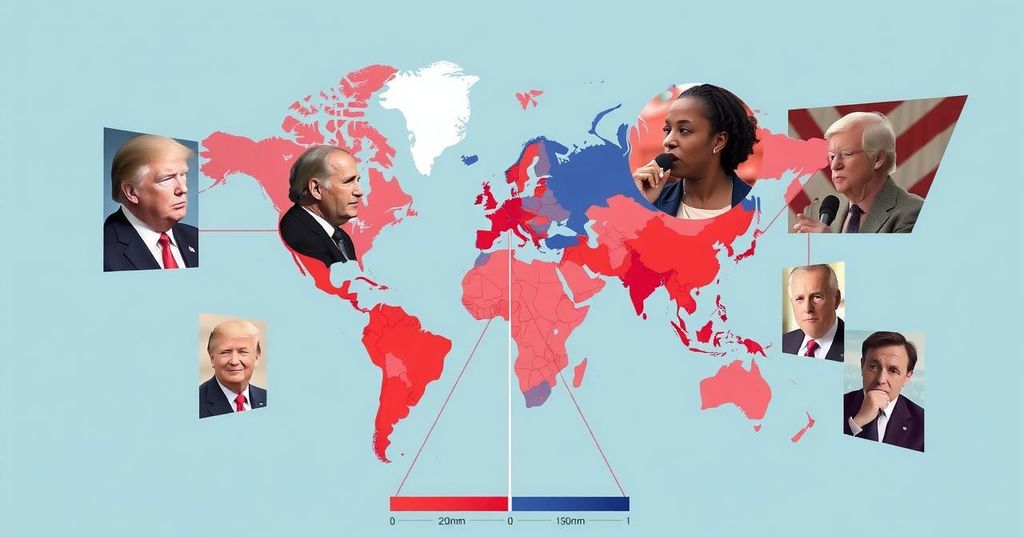World news
AFRICA, AFRICAN NATIONAL CONGRESS, ASIA, BASHA, BASHAR AL - ASSAD, BHARATIYA JANATA PARTY, BRITAIN, CONSERVATIVE PARTY, EUROPE/ASIA, GOVERNANCE, GOVERNMENT, LABOUR PARTY, LIBERAL DEMOCRATIC PARTY, MACKY SALL, MOHAMMAD AL GERGAWI, NA, NORTH AMERICA, OPPOSITION, PARLIAMENTARY SEATS, POLITICS, PRESIDENTIAL ELECTION, RUSSIA, SOUTH AFRICA, UNITED ARAB EMIRATES, UNITED STATES
Ethan Kim
0 Comments
2024: The Year of Global Anti-Incumbent Sentiment and the Call for Hopeful Governance
The article analyzes the global anti-incumbent wave of 2024, where leaders faced significant electoral losses and institutional crises. It underscores the need for governments to engage citizens meaningfully, leveraging social media to restore trust, address economic conditions, and offer hopeful visions for the future. It emphasizes that leaders must move beyond crisis management to nurture a politics that inspires hope and empowerment among their constituents.
The year 2024 has witnessed a remarkable backlash against incumbent politicians across the globe, with many leaders being ousted from power through both elections and forceful means. A significant statement from Mohammad Al Gergawi, the UAE’s Minister of Cabinet Affairs, poignantly emphasizes the necessity for governments to cultivate a hopeful future for their citizens. Thus, as political leaders gaze towards 2025, it is crucial they transition from mere crisis management towards crafting an inspiring agenda that ignites hope among the populace.
The phenomenon of the global anti-incumbent wave has been striking. In March, President Macky Sall of Senegal faced a decisive electoral defeat as he attempted to postpone elections. June marked a historic shift in South African politics as the African National Congress lost its congressional majority for the first time in three decades, heralding a new coalition government. Concurrently, the Indian Prime Minister Narendra Modi also experienced a significant loss in parliamentary control.
As the year progressed, the trend of political upheaval continued, with notable events including the Labour Party’s landslide victory over the Conservative Party in Britain in July, and the loss of parliamentary majority for Japan’s ruling Liberal Democratic Party in October. Additionally, French Prime Minister Michel Barnier became the first to be removed by a no-confidence vote in over six decades. Other governments have faced upheaval, with Bangladesh’s Sheikh Hasina fleeing amidst protests and Syria’s Bashar al-Assad escaping to Russia following regime collapse.
Incumbents’ losses may be attributed, in part, to the pervasive influence of social media, which research suggests often catalyzes a decline in governmental trust and exacerbates political polarization. Social media connections contribute to an echo chamber effect, enhancing the conformity of opinions and amplifying radical narratives like conspiracy theories.
Moreover, while social media may empower far-right populist movements, electoral outcomes indicate that mainstream parties can still prevail, albeit with diminished influence. Countries like Mexico, Spain, and Greece illustrate this complex electoral landscape where incumbents successfully retained power despite overarching global anti-incumbent sentiments.
From these political shifts, a compelling imperative emerges: governments must master the art of engaging with voters through social media to address their concerns directly. Evidence from recent electoral campaigns indicates that citizens’ perceptions of government quality range widely—from ‘irrelevant’ to ‘self-serving’—implying a significant disconnect between leaders and the populace.
To rebuild trust, political leaders must prioritize economic recovery and empower citizens. A comprehensive study on populism underscores the profound impact of economic conditions on governmental acceptance. For instance, voters in Spain and Greece supported their incumbents thanks to strong economic performance, while in Germany and France, lackluster economic growth triggered political instability.
Leaders must transcend yearly budgetary confines to articulate ambitious visions for their nations. Historical precedent suggests that transformative government programs, such as the New Deal, emerged from adversity. Current leaders ought to draw inspiration from such initiatives, aiming to address systemic issues that impede citizen satisfaction.
It is imperative for leaders to foster a politics of hope that fortifies public confidence in democratic systems. Responses from constituents in Grimsby reflect a yearning for governance characterized by realism, passion, and empowerment. A government that fulfills these aspirations is more likely to earn the trust of its citizens and instill renewed hope in the political process.
The article examines the trend of anti-incumbent sentiments that have manifested globally in 2024, highlighting how established political figures in various countries have faced electoral defeat or removal during a period characterized by crisis and discontent. It addresses the possible reasons behind this phenomenon, including the transformative power of social media, the significance of economic conditions, and the public’s demand for governance that inspires hope rather than dread. The discussion emphasizes the need for political leaders to reconnect with citizens and to envision a future that fosters trust and empowerment.
In summary, the developments of 2024 highlight a profound global shift in political sentiments, with incumbents facing significant challenges. The need for governments to use social media effectively, focus on economic growth, and restore citizen empowerment is more critical than ever. Political leaders should draw lessons from historical precedents to cultivate a hopeful and realistic vision for the future, as fulfilling public aspirations is essential for rebuilding trust and maintaining democratic integrity.
Original Source: www.aspistrategist.org.au




Post Comment